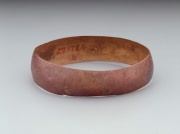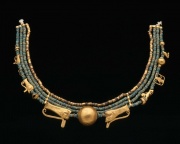Difference between revisions of "Electrum"
Jump to navigation
Jump to search
| Line 1: | Line 1: | ||
| − | [[File:20.1724b-E11772CR-d1.jpg|thumb|Egyptian | + | [[File:20.1724b-E11772CR-d1.jpg|thumb|Egyptian bracelet<br>MFA 17.1742]] |
== Description == | == Description == | ||
[[File:13.3609-E9229CR-d1.jpg|thumb|Beaded collar<br>MFA# 13.3609]] | [[File:13.3609-E9229CR-d1.jpg|thumb|Beaded collar<br>MFA# 13.3609]] | ||
Latest revision as of 13:34, 1 August 2022
Description
1) An naturally occurring alloy of Gold and Silver. All gold ore contains some silver ranging in concentrations from 1% to 80%. Proportions of up to 20% silver produce a pale gold, or amber, color alloy and hence derived the name 'electrum' (Greek for amber). Electrum has been used for jewelry and decorative items since ancient times.
2) Modern metal mixtures that has a pale gold color such as a mixture containing Copper (50%), Nickel (30%), and Zinc (20%). Other such alloys are German silver and Nickel silver.
3) An old name for Amber.
Synonyms and Related Terms
elektrum; électrum (Fr.); electrum (Ned.)
Resources and Citations
- G.S.Brady, Materials Handbook, McGraw-Hill Book Co., New York, 1971 Comment: p. 371
- Ralph Mayer, A Dictionary of Art Terms and Techniques, Harper and Row Publishers, New York, 1969 (also 1945 printing)
- David C. Scott, Metallography and Microstructure of Ancient and Historic Metals, The Getty Conservation Institute, Los Angeles, 1991
- Jack Odgen, Jewellery of the Ancient World, Rizzoli International Publications Inc., New York City, 1982
- Random House, Webster's Encyclopedic Unabridged Dictionary of the English Language, Grammercy Book, New York, 1997
- The American Heritage Dictionary or Encarta, via Microsoft Bookshelf 98, Microsoft Corp., 1998
- Wikipedia at http://www.wikipedia.com Comment: electrum

